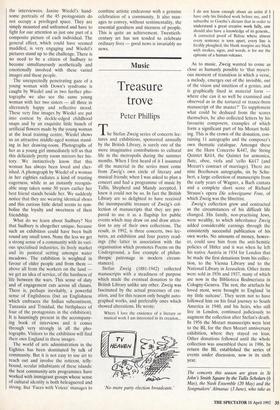Music
Treasure trove
Peter Phillips
The Stefan Zweig series of concerts lec- tures and exhibitions, sponsored annually by the British Library, is surely one of the more imaginative contributions to cultural life in the metropolis during the summer months. When I first heard of it I assumed all the material in the series must come from Zweig's own circle of literary and musical friends; when I was asked to plan a concert and had a programme of music by Tallis, Shepherd and Mundy accepted, I knew it could not be so. In fact the British Library are so delighted to have received the incomparable treasure of Zweig's col- lection of manuscripts that they are pre- pared to use it as a flagship for public events which may draw on and draw atten- tion to any of their own collections. The result, in 1992, is three concerts, two lec- tures, an exhibition and four poetry read- ings (the latter in association with the organisation which promotes Poems on the Underground, a fine example of philan- thropic patronage in modern circum- stances).
Stefan Zweig (1881-1942) collected manuscripts with a steadiness of purpose which made the eventual donation to the British Library unlike any other. Zweig was fascinated by the actual processes of cre- ation, and for this reason only bought auto- graphed works, and preferably ones which showed alterations. He wrote:
Where I love the existence of a literary or musical work I am interested in its creation...
'No more party election broadcasts.' I do not know enough about an artist if I have only his finished work before me, and I subscribe to Goethe's dictum that in order to understand a great creative work fully, one should also have a knowledge of its genesis... A corrected proof of Balzac where almost every sentence is torn apart, every line is freshly ploughed, the blank margins are black with strokes, signs, and words, is for me the epitome of a human volcano.
As to music, Zweig wanted to come as close as humanly possible to `that myseri- ous moment of transition in which a verse, a melody, emerges out of the invisible, out of the vision and intuition of a genius, and is graphically fixed in material form where else can it so well be examined and observed as in the tortured or trance-born manuscript of the master?' To supplement what could be deduced from the scores themselves, he also collected letters by his favourite composers, examples of which form a significant part of his Mozart hold- ing. This is the crown of the donation, con- taining 11 autographs and the composer's own thematic catalogue. Amongst these are the Horn Concerto K447, the String Quintet K614, the Quintet for armonica, flute, oboe, viola and `cello K617 (and Mozart's contract of marriage). There arc nine Beethoven autographs, six by Schu- bert, a large collection of manuscripts from the early years of Wagner, a Bach cantata and a complete short score of Richard Strauss's opera Die schweigsame Frau, of which Zweig was the librettist.
Zweig's collection grew and contracted as the circumstances of his difficult life changed. His family, non-practising Jews, were wealthy, to which inheritance Zweig added considerable earnings through the consistently successful publication of his own works. No amounts of money, howev- er, could save him from the anti-Semitic policies of Hitler and it was when he left his native Austria in 1934 for London that he made the first donations from his collec- tion, to the Vienna Library and to the National Library in Jerusalem. Other items were sold in 1936 and 1937, many of which are now in the Biblioteca Bodmeriana in Cologny-Geneva. The rest, the artefacts he loved most, were brought to England In my little suitcase'. They seem not to have followed him on his final journey to South America in 1940, and his heirs, who still live in London, continued judiciously to augment the collection after Stefan's death.
In 1956 the Mozart manuscripts were lent to the BL for the then Mozart anniversary exhibition, where they stayed on loan.
Other donations followed until the whole collection was assembled there in 1986. In return the BL established the series of events under discussion, now in its sixth year.


















































 Previous page
Previous page